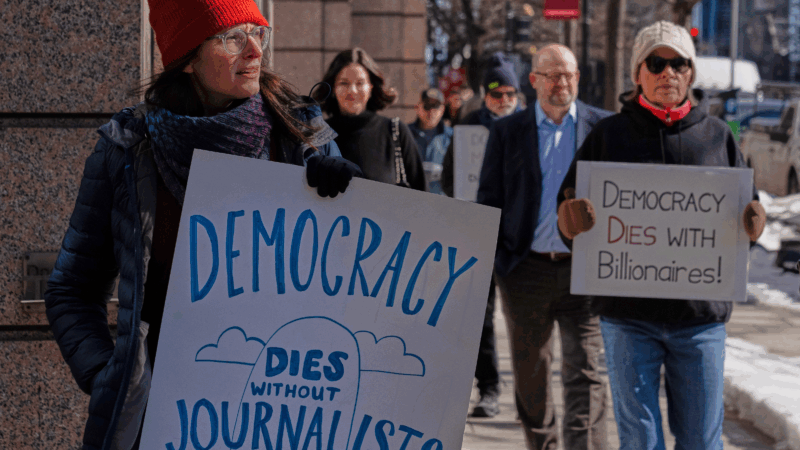Alabama Utility Commission To Consider Ban on Recording Meetings
When Laura Casey attended a highly-anticipated hearing of the Alabama Public Service Commission (PSC) in November, she wanted to record it for people who couldn’t be there.
“My understanding was that the Open Meetings Act, which is the law of the state of Alabama, allows people to record their public officials in action,” said Casey, who is the Democratic candidate for commission president this year.
But PSC officials ordered her to stop recording and ejected her from the room. Casey filed a lawsuit accusing the commission of violating the state’s Open Meetings Act. In the suit, the PSC said formal hearings are not meetings, so the commission is not required to let people record them. A Montgomery circuit court judge agreed, ruling that because commissioners did not “deliberate” during the hearing, it doesn’t qualify as a “meeting.”
Now the PSC is formalizing that stance and adding additional restrictions with its proposed Media Coverage Plan. Under the new rules, people can not live stream or even update social media during formal hearings. News organizations must request permission to record or photograph at least five days in advance, and all parties involved in the hearing must allow it. Any party can also ask to stop the recording at any time during the hearing.
Frank LoMonte, media law professor at the University of Florida and director of the Brechner Center for Freedom of Information, said the restrictions are similar to those of judicial bodies and trial courts.
“That would be a very unusual and extreme policy for any type of an executive branch agency,” LoMonte said.
He said the Public Service Commission, which regulates state utilities, is governed by Alabama’s Open Meetings Act, whether it is conducting a meeting or a hearing.
“The state Open Meetings Act is very clear that the right to attend the meeting includes the right to non-disruptively make a recording of it,” LoMonte said.
The Alabama Broadcasters Association, Alabama Press Association and AL.com are in agreement. In comments submitted to the PSC, the groups said the commission does not have the legal authority to prohibit recordings or require consent from all parties in a hearing.
“This veto power places unprecedented authority in the hands of a select few persons and is clearly meant to suppress public scrutiny based on a single vote,” the groups wrote.
The PSC adopted the Media Coverage Plan on an interim basis in March, days before hearings began regarding Alabama Power’s proposed $1.1 billion expansion. The commission wrote that it decided to temporarily adopt the plan “after due consideration of the current state of technology and the potential impact that recording and broadcasting can have on formal hearings.” It said the new rules will help “preserve the integrity” of formal hearings.
Laura Casey, who is appealing the trial court’s decision rejecting her lawsuit against the PSC, said the plan further limits transparency of the state’s regulatory agency.
“They are effectively shutting down the Public Service Commission to the public,” Casey said.
The commission will accept comments on the media plan through Friday and will later vote on permanently adopting the rules at a monthly meeting.
PSC officials declined to be interviewed for this story.
For many U.S. Olympic athletes, Italy feels like home turf
Many spent their careers training on the mountains they'll be competing on at the Winter Games. Lindsey Vonn wanted to stage a comeback on these slopes and Jessie Diggins won her first World Cup there.
Immigrant whose skull was broken in 8 places during ICE arrest says beating was unprovoked
Alberto Castañeda Mondragón was hospitalized with eight skull fractures and five life-threatening brain hemorrhages. Officers claimed he ran into a wall, but medical staff doubted that account.
Pentagon says it’s cutting ties with ‘woke’ Harvard, ending military training
Amid an ongoing standoff between Harvard and the White House, the Defense Department said it plans to cut ties with the Ivy League — ending military training, fellowships and certificate programs.
‘Washington Post’ CEO resigns after going AWOL during massive job cuts
Washington Post chief executive and publisher Will Lewis has resigned just days after the newspaper announced massive layoffs.
In this Icelandic drama, a couple quietly drifts apart
Icelandic director Hlynur Pálmason weaves scenes of quiet domestic life against the backdrop of an arresting landscape in his newest film.
After the Fall: How Olympic figure skaters soar after stumbling on the ice
Olympic figure skating is often seems to take athletes to the very edge of perfection, but even the greatest stumble and fall. How do they pull themselves together again on the biggest world stage? Toughness, poise and practice.






